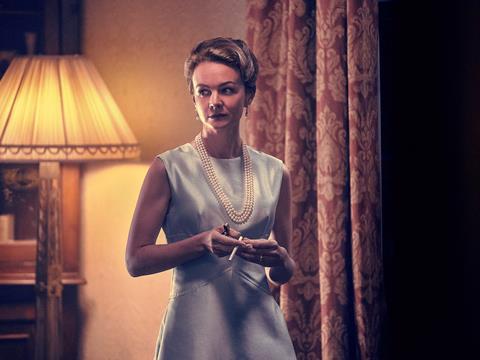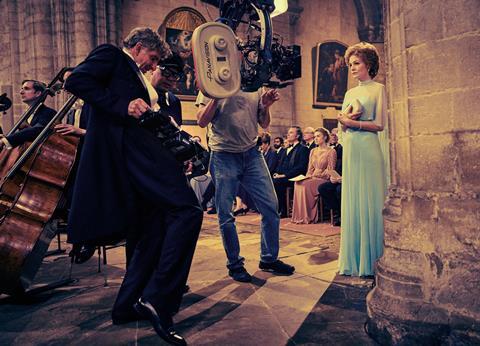Carey Mulligan says she had never allowed herself to let go fully as an actor before playing Felicia Bernstein in Maestro. She tells Screen why this role was different.

Carey Mulligan first met her Maestro co-star and director Bradley Cooper at the Council of Fashion Designers of America’s annual awards in New York in 2009. The pair stayed in contact over the next nine years, meeting up whenever they were on stage in New York or London. Then, in 2018, when she was doing Dennis Kelly’s monologue Girls & Boys off-Broadway, Cooper invited Mulligan for coffee and asked her to play Felicia Montealegre Bernstein, the devoted wife of Leonard Bernstein, in a movie he was preparing about the legendary conductor.
At the time, Cooper’s feature directing debut A Star Is Born had yet to be released and Mulligan was eager to see it before committing to the role, bringing along her friend and future She Said co-star Zoe Kazan to a midtown screening room to get her opinion, “because she’s got very good taste”.
“I didn’t want to jump in just because I think he’s such an incredible actor,” explains Mulligan, regarding her measured approach to a role that has netted her Oscar and Bafta nominations. “It would be great if he was also a brilliant director. Afterwards, Zoe and I walked to downtown to where I was staying, talking about how much we loved it.”
Maestro — which Netflix released on its streaming service last December, after a theatrical run and festival berths including Venice, New York and London — tells of Bernstein’s complex marriage to Felicia Montealegre, a Chilean artist and actress. The pair had three children together, despite Bernstein being gay. “She was so witty, dry and loving,” says Mulligan. “Lenny remained the way he was his entire life, for good or ill, and she went on this unbelievable journey as a person. The crowd she ran with in Santiago was all poets and artists. And she was determined to come to New York and pursue acting.”
Felicia reminded Mulligan of Nina from Chekhov’s The Seagull, the role with which she made her Broadway debut in 2008. “But whereas Nina discovers what it is to be an artist, I don’t know if Felicia ever let herself. She did suffer tragedy the same way Nina did, falling in love with this person she devoted her life to and sacrifices herself on the altar of,” muses Mulligan, who is married to musician Marcus Mumford. “What must it have been like to be two artists in a relationship? One is a good actor; the other this once-in-a-generation, touched-by-God talent. The more I found out about her, the more I wanted to find out.”
Which was just as well, because Cooper needed Mulligan to not hold back, as she embarked on what she calls “the most intense preparation” she had ever undertaken. “Bradley was quite clear. He said, ‘I want you to do this, but I need you to go all in with me.’ I wanted to do Felicia justice. But I’d never done all in,” she reflects. “I was listening to Felicia talk about the Actors Studio [the New York training ground famed for teaching the Method] and she said, ‘They all talk about their feelings and cry and writhe around on the floor and it’s nonsense.’”
Mulligan — whose big film break was 2009’s An Education, for which she was Oscar-nominated and won a Bafta — did not go to drama school and admits to finding the whole notion of letting go somewhat intimidating. “I’ve never done it because I thought it would be embarrassing or I’d do it badly. I wish I could burst into tears and lie down on the floor and pretend to be a leopard. But I decided, with Bradley, I was going to burst into tears and pretend to be a leopard. So I did.”
This meant meeting Felicia’s children, Jamie, Alex and Nina; working with voice coach Tim Monich on Felicia’s dialect; learning to paint; and also visiting Felicia’s family in Santiago. “Her nephew hosted me for three days, showed me around and introduced me to everyone. I went to her school and the neighbourhood she grew up in. They showed me the cupboard where they used to lock students when they were naughty.”
Time out

On the way back from Santiago, Mulligan tested positive for Covid at the airport. “I got sent to my hotel room. Netflix asked what I needed, because my kids were in New York. I said, ‘I want some paints, a canvas and an easel’, and spent 10 days copying her paintings, looking out the window and listening to podcasts. It was amazing. I wouldn’t have allowed myself that time because I have children, but to have 10 days, completely on my own, slightly going mad, was great.”
There were also many hours rehearsing with Cooper as Felicia and Lenny, “copying recordings of them talking, then improvising as them, but in the same rhythms they spoke in, so we could talk like them without having dialogue”. They also took part in a week-long dream workshop together. “Basically, you write down your dreams, tell them to each other and work on them,” she recalls. “It sounds arty, wanky, but the point is to try and connect your subconscious to the material or to the character you’re playing, so by the time you get on set, there’s stuff baked into you that you don’t need to act.” There are two scenes in the film where Felicia and Lenny sit back-to-back on the ground and talk, an idea that came from the workshop. “By the end of that week, we’d cried in front of each other so much, we were bonded for life.”
Much like Felicia and Lenny, in fact, who were inseparable despite Bernstein’s infidelities. “They were the best of everything,” says Mulligan. “They were best friends, they were lovers, they were truly soulmates and meant to be together. After she passed, he was completely untethered. There was something about them together that was magnetic and awesome. The two of them were nuclear. Any time they were apart it was a disaster.”
Mulligan’s second Oscar nomination came for Emerald Fennell’s Promising Young Woman and she turns up again in the director’s follow-up Saltburn, as Poor Dear Pamela. “Initially, she asked me to play a smaller part. And I read the script and said, ‘Can I play that one?’” recalls Mulligan, her face lighting up at mention of the film. “First, it’s the best name for a character ever. It’s written in the script as Poor Dear Pamela. She’s never referred to as Pamela. And I wanted to be on [Fennell’s] set again. She’s a genius. She had this idea of a mad red wig and tattoos with ‘Daddy’ on. Then we came up with this backstory of Pamela being responsible for [rock band] The Verve breaking up. I was there for three days but it was so ridiculous and fun, I loved it. It was the best set to be on.”















![[L-R]: Amanda Villavieja, Laia Casanovas, Yasmina Praderas](https://d1nslcd7m2225b.cloudfront.net/Pictures/274x183/6/4/1/1471641_pxl_20251224_103354743_618426_crop.jpg)









No comments yet